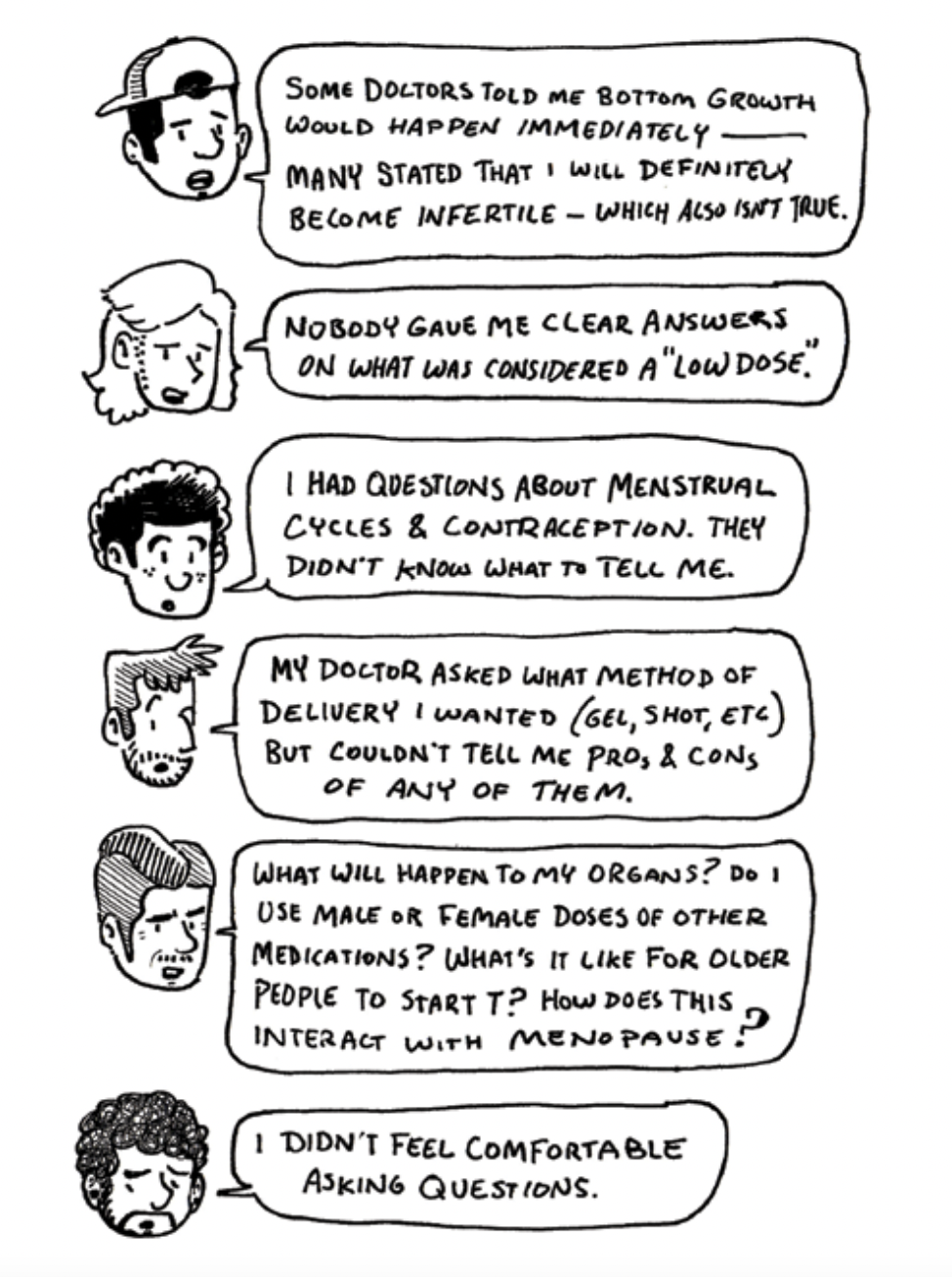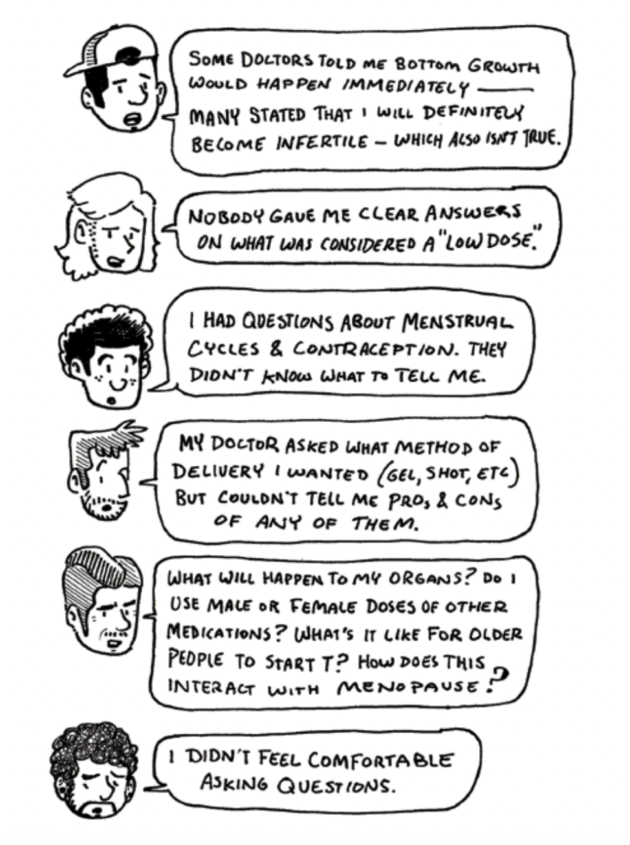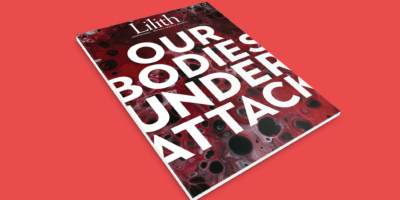
The Current Mysteries of Testosterone
In Fall 2021, I went on a walk with a friend just beginning their journey of medical transition. After nearly a decade being out as non-binary, they started taking testosterone. As often happens between trans friends, they asked me a few questions here about my experience as a non-binary person on testosterone, which I’d been taking for nearly three years. It’s a conversation I’d had many times before, with many different people.
I did my best to answer questions about timelines, results, vocal changes, emotional shifts, what constituted a “low dose”, and more. I shared my own experience in earnest—but, as always, found I had few resources, since precious little research has been done on the effects of testosterone on our trans bodies.
What made this conversation different was the sense of mission that arose in me, and remained there even after I’d returned home.
In this era where bodily autonomy for women and trans folks is under sustained attack, there are no extensive, accessible resources to help us understand what kinds of changes trans people can anticipate from hormone therapy beyond a very basic overview. Many of us learned about the details of medical transition through online forums and anecdotal experience, rarely with the help of medical practitioners and hardly ever with the guidance of well-funded, long-term research. Many of us have chosen to roll the dice anyway, knowing that the decision to transition can be transformative and life-saving. But we shouldn’t have to do this in the dark.
It is 2022, nearly 60 years since the first documented prescriptions of HRt (Hormone Replacement Therapy, sometimes also called GaHt, or “Gender Affirming Hormone Therapy”). While we’re seeing a global increase in access to hormone therapies, this has not been followed by accurate information which allows transgender people to make informed decisions about transitional health. We are among many marginalized groups who often encounter an absence of research specific to their needs and bodies. This absence of research is medical neglect.I decided to design a survey to hear directly from other transgender people about their experiences, feelings, and insights on transitioning using testosterone. In a state of creative flurry, I drafted questions, called a handful of trans friends, revised the list, and got to work launching a questionnaire. The 73-question, Google Form survey opened in late December 2021, asking questions about dosage, ease of access to care, identity, struggles with medication, unanswered questions, as well as physical, emotional, sexual, and spiritual changes.
 Without funds to pay contributors, I had hoped to hear from 20, maybe 30 people. When the survey closed on January 10th, 2022, it had garnered a remarkable 389 responses—significantly more than the majority of professional trans healthcare research studies. While the pandemic’s omicron wave drove everyone indoors (and with more time on their hands to take a lengthy survey), I attribute the remarkably large number of survey responses to the truth that this survey responded to a serious and recognized community-wide need.
Without funds to pay contributors, I had hoped to hear from 20, maybe 30 people. When the survey closed on January 10th, 2022, it had garnered a remarkable 389 responses—significantly more than the majority of professional trans healthcare research studies. While the pandemic’s omicron wave drove everyone indoors (and with more time on their hands to take a lengthy survey), I attribute the remarkably large number of survey responses to the truth that this survey responded to a serious and recognized community-wide need.
Previously, in order to gain access to hormonal treatment, trans people were forced to go through an often-abusive process requiring a diagnosis of “gender dysphoria” and a letter from a therapist determining if one was “trans enough.” Today’s best-practice informed consent model allows adults to sign up for hormonal treatment without gatekeeping. But how useful are these models without proper information to consent to?
We all have a right to accurate and current medical information about our decisions to start or continue HRT. Many of my survey responses show that too many of us don’t even know what questions to ask.
The trans community has often been hesitant to engage in critical discussion about the dangers and risks of HRT for fear that we may lose the scarce, often life-saving care that activists have long fought to achieve. But as a growing number of people are choosing to transition via medication, we need to know about effects on our reproductive health, interactions with other medications, and pre-existing physical as well as mental health conditions. We need this information to take into account class, ability-status, and racial diversity as well.
There is no singular “trans narrative.” People take testosterone for a variety of reasons, hold a variety of identities, with a variety of hesitancies and fears. As reflected in my survey results, many respondents feel ambivalent about the effects of testosterone on everything from fertility to body hair, bottom growth to changes in emotional experiences or sexual orientation. And they’re right to express uncertainty: results showed that the vast majority of respondents experienced significant change in sexuality, emotions, and relationship to their bodies. While these changes were largely welcomed as positive, any significant life change unearths a variety of feelings that deserve to be spoken about and brought to light.
As I finish illustrating the results and culling together my analysis of the survey data, I’ve created “The Testosterone Survey Zine,” a public health art project designed to empower people transition- ing on testosterone with knowledge, to help us ask vital questions about our bodies and needs, and hopefully, to make us all feel a little less alone.
It is also designed for doctors, educators, therapists, and all those who care for trans people to learn more about our experiences, struggles, and needs as they relate to medical transition using testosterone (sometimes referred to as “T”).
This survey was created as an art project—not as a scientific study. I’m a transgender comic artist and writer, and I hope the zine will do what all good art does: inspire new questions and catalyze change.
As a transmasculine, non-binary person who has been on HRT for three years, I decided to limit this survey to experiences on testosterone, feeling that a focus related to my own experience would be the most effective project. Similar projects and professional research should and must exist for those who are transitioning using Estrogen and Progesterone.
I have not drawn many conclusions from the dataset, but rather present it visually in the zine for readers to engage with through their own questions, hoping that through the continued unknowns, we will learn how to ask better questions about trans health. May we continue to work towards more just, safe, and empowered healthcare outcomes for all trans people.
_
Rena Yehuda Newman (They/Them) is an artist and writer and Editor in Chief of New Voices, the magazine by and for Jewish college students.
Updates on the Testosterone Survey Zine at tinyurl.com/TestosteroneSurveyZineEmailSignup.



